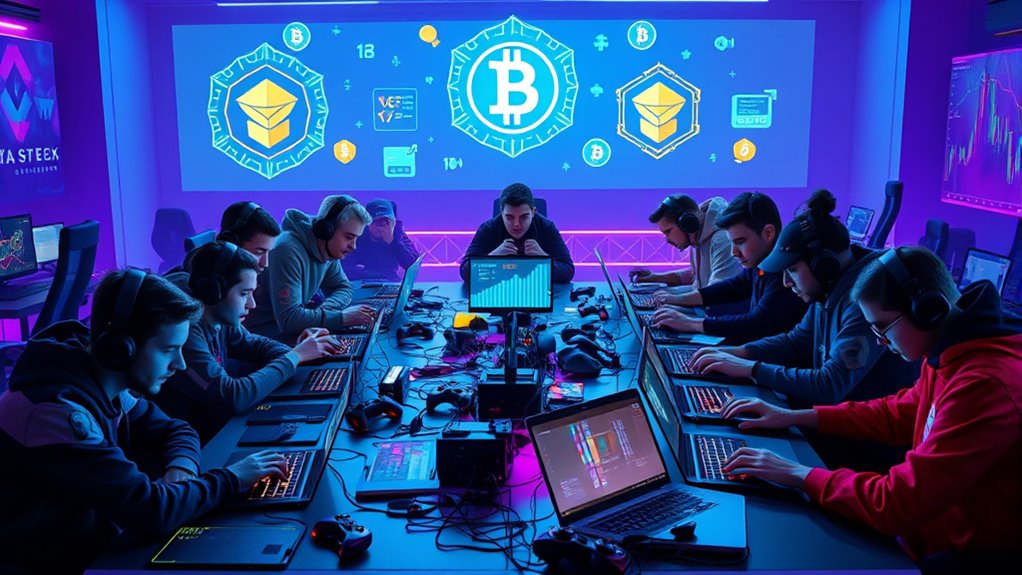Crypto gaming guilds can feel like genuine communities, giving players ownership through NFTs and collective governance. But as some guilds grow larger and more centralized, they risk becoming cartels that prioritize profit over community. This shift blurs the lines between participatory ecosystems and controlling entities. If you want to understand how these dynamics are evolving and what it means for gamers like you, there’s much more to explore below.
Key Takeaways
- Blockchain integration enables true ownership and governance, fostering community-driven decision-making within gaming guilds.
- Large guilds or platforms holding significant influence can resemble centralized cartels, raising decentralization concerns.
- Token governance empowers members but may lead to power imbalances, blurring lines between genuine community and elite control.
- Decentralized ecosystems promote transparency and inclusivity, supporting community engagement over cartel-like dominance.
- The evolving landscape suggests a shift towards participatory models, challenging traditional hierarchical structures in crypto gaming guilds.

Have you ever wondered how gaming communities are evolving in the crypto era? It’s fascinating to see how blockchain technology is transforming traditional gaming into something much more participatory and decentralized. One of the key innovations driving this shift is NFT integration. Now, players can own unique digital assets—skins, characters, in-game items—that aren’t just tied to a single game server but are truly theirs, stored securely on the blockchain. This ownership shifts power away from developers and publishers, giving players the ability to trade, sell, or showcase their assets across different platforms. It’s a game-changer for community engagement because it creates a sense of true ownership and investment, making players feel like they’re part of something bigger than just a game.
Alongside NFT integration, token governance plays a crucial role in how these communities are shaping up. Instead of a top-down approach where decisions are made solely by game developers, token governance allows players to have a say in the direction of the game or guild. When you hold governance tokens, you can vote on changes, new features, or rules that impact the community. This democratic approach fosters a sense of collective ownership and responsibility, encouraging active participation from community members. It also helps align interests; when players know they have a voice, they’re more likely to invest time and resources into the guild’s success. As these systems mature, you’ll see more community-driven initiatives, where players aren’t just passive consumers but active stakeholders shaping the future of the game.
This convergence of NFT integration and token governance is redefining what it means to be part of a gaming community. Instead of simply joining a guild for socializing or competition, you’re now participating in a decentralized ecosystem where your contributions matter. You can earn and trade digital assets, make collective decisions, and even influence the game’s development. It’s a shift toward a more inclusive, transparent, and participatory environment that appeals to gamers seeking more control and ownership. Yet, this evolution also raises questions about centralization versus decentralization, especially when large guilds or platforms exert significant influence. Still, the core idea remains: blockchain is empowering players to become active stakeholders, blurring the lines between community and cartel, and opening new avenues for innovation in the gaming world. Additionally, understanding blockchain’s role in enabling these features helps clarify how decentralized governance models are reshaping player engagement.
Frequently Asked Questions
How Do Crypto Gaming Guilds Generate Revenue?
Crypto gaming guilds generate revenue mainly through NFT integration and token staking. You lend your NFTs or digital assets to the guild, earning a share of the profits when those assets generate in-game revenue or are sold. Additionally, by staking tokens, you support the guild’s ecosystem and earn rewards or interest. This system allows the guild to monetize its activities while incentivizing members to contribute and stay engaged.
What Are the Risks for New Members Joining Guilds?
When you consider joining a guild, you should be aware of membership risks and trust concerns. New members might face scams, unfair fee structures, or lack of transparency about how funds are managed. Trust concerns arise if the guild’s reputation is unclear or if there’s no clear communication. Always research the guild‘s background, ask questions, and guarantee you’re comfortable with their practices before committing to avoid potential pitfalls.
How Transparent Are Guild Operations and Fund Management?
You want to know about guild transparency and fund accountability, and it varies widely. Some guilds operate openly, sharing detailed financial reports and decision-making processes, which builds trust. Others keep operations more secretive, raising concerns about fund accountability. As a member, you should look for clear communication and documented governance practices to verify the guild is transparent and accountable, helping you make informed decisions and avoid potential risks.
Can Individuals Profit Without Joining a Guild?
You can profit without joining a guild by directly investing in crypto assets or participating in individual gameplay. Guild membership often involves profit sharing, where members pool resources and share earnings. However, you don’t need to be part of a guild to earn from crypto gaming—many players succeed solo. Just be aware that without a guild, you might miss out on shared resources and collective strategies that could boost your earnings.
What Legal Issues Surround Crypto Gaming Guilds?
You might face legal ambiguities and regulatory challenges when dealing with crypto gaming guilds. These guilds often operate in a gray area, making it unclear whether their activities comply with existing laws. Regulations around digital assets, gaming, and online communities are evolving, so you need to stay informed. Without proper legal guidance, you risk penalties or disputes, highlighting the importance of understanding the legal landscape surrounding these guilds.
Conclusion
So, as you explore crypto gaming guilds, remember they can be both vibrant communities and powerful cartels. Your involvement shapes their future—whether you find a supportive network or get caught in a competitive, profit-driven environment. Stay informed and cautious, and choose your guild wisely. Ultimately, it’s up to you to decide if these groups enhance your gaming experience or serve their own interests at your expense. Your participation will define their true nature.









